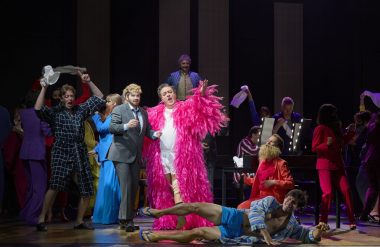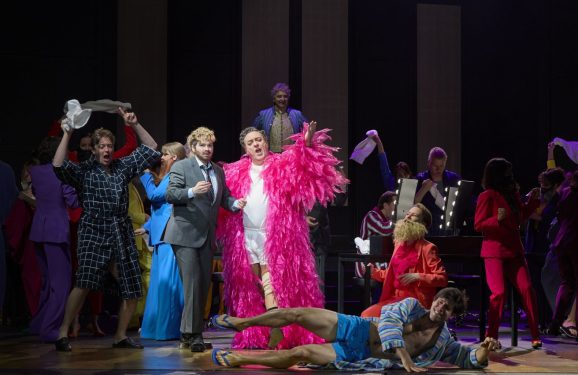 Austria Salieri, Kublai Khan: Soloists, Arnold Schoenberg Choir, Les Talens Lyriques / Christophe Rousset (conductor). MuseumsQuartier, Halle E, Vienna, 5.4.2024. (CR)
Austria Salieri, Kublai Khan: Soloists, Arnold Schoenberg Choir, Les Talens Lyriques / Christophe Rousset (conductor). MuseumsQuartier, Halle E, Vienna, 5.4.2024. (CR)

Production:
Director – Martin G Berger
Set – Sarah-Katharina Karl
Costumes – Alexander Djurkov Hotter
Lighting – Karl Wiedemann
Video design – Roman Rehor
Dramaturgy – Philipp Amelungsen and Christian Schröder
Cast:
Kublai – Carlo Lepore
Lipi – Lauranne Oliva
Timur – Alasdair Kent
Alzima – Marie Lys
Posega – Leon Košavić
Orcano – Fabio Capitanucci
Bozzone – Giorgio Caoduor
Memma – Ana Quintans
Salieri – Christoph Wagner-Trenkwitz
Kublai-Kugeln – Máté Rácz and Monica Sandulescu
Sometimes it seems that Antonio Salieri appears as a character onstage more often than his operas themselves are presented. Long before Peter Schaffer’s ubiquitous Amadeus (in both its stage and film versions) there was Pushkin’s play Mozart and Salieri which spawned Rimsky Korsakov’s opera of the same name. In this newly adapted, irreverent version of Cublai, Gran Kan de’ Tartari (as it was originally titled) sung here in Italian in Vienna’s MuseumsQuartier, Salieri at least gets to star in his own opera, even if he is, again, somewhat in the shadow of Mozart.
The comic opera was composed in 1787, but never performed in the composer’s lifetime. It is set at the court of Kublai Khan (needless to say it bears little relation to any real history) at a time when the ruler seeks to cement relations with neighbouring powers and extend his empire, by marrying his son Lipi to Alzima, a Bengali princess. In the usual fashion of an opera buffa things do not go to plan, as she is already in love with Kublai’s nephew, Timur, who was sent to bring her to the court in Cathay (China). Lipi, who has been somewhat isolated from the world and brought up by his tutor Posega, shows no interest in women. Among various other intrigues and mishaps, all comes right when Timur is allowed to marry Alzima and he becomes the heir instead, allowing Lipi to pursue his own interests. Although set in the far East, the scenario was understood to be a satire upon the workings of Western courts, and specifically that of Russia. When Joseph II unexpectedly forged an alliance with that country in 1787 to wage a war against the Ottoman Turks, the opera had to be withdrawn so as not offend diplomatic sensibilities.
That fact is related during the course of the overture, and so what may otherwise have been a straight realisation of the work, as though it were in 1787, is abruptly halted as Salieri explains the bad news. Within what is claimed to be the premiere of the original Italian version of the opera (however presented), a new scenario by Martin G Berger and Philipp Amelungsen has been created also receiving its first outing. The result, as staged and directed here by Berger, is Kublai Khan. It has the composer as an additional speaking part, played here by Christoph Wagner-Trenkwitz with stoical resilience, and largely jettisons the opera’s recitatives by substituting its own dialogue.
The concept of this adaptation is that Salieri is taken forwards to 2022 when the opera can finally be staged, and its themes and Orientalist assumptions are made to conform more with twenty-first century sensibilities. The title character becomes ‘Schorsch’ Kublai, a descendant of Kublai, who is the head of a confectionery firm which makes praline chocolate balls (anyone remotely familiar with Vienna will recognise the reference to the famous Mozartkugeln or Mozart balls). For the firm’s 100th anniversary he has the idea of putting on a production of the opera about his ancestor in which Salieri then effectively becomes the impresario. That metatheatrical frame is intertwined with the scenario of the opera itself in which the plan to marry Lipi to Alzima is connected with the firm’s intention to expand its business empire by taking over the latter’s company.
Set in early 2022, proceedings are thwarted again with the outbreak of the war in Ukraine, causing Salieri to reflect that censorship surrounding geopolitics involving Russia shouldn’t derail the production for a second time nor should it be deemed inappropriate to engage with humour at such a time, as we need comedy and nonsense to say the things that dictators won’t allow or don’t see in a funny manner. Flexibility in the exercise of power (like a true Enlightenment rule and not a mediaeval warlord) is praised in the ceding of power by Kublai not to his son, Lipi, but sideways to his nephew instead. Diversity is celebrated by having Lipi’s disinterest in women explained here by the fact that he is gay and besotted with his tutor Posega, prompting much romping around in bondage gear and sending up the natural middle- and upper-class assumptions about how sons should be brought up in order to uphold family respectability. And cultural conventions are also satirised by preserving Kublai’s command that beards are shaven off to emulate the fashion of eighteenth-century European society – but in the process, no doubt casting a swipe at the present-day prevalence of hirsute appearances among younger men.
Salieri also claims that, in the narrative, women bring about a revolution. Although it is true that opera buffa often turns on the clever ruses of its female characters to dupe overbearing or incompetent men, here the new dialogue doesn’t promote the role of the women and, as Alzima observes in one aria, events are being directed without her say in the matter. That is a small oversight in an otherwise lively, and often camp presentation of the original opera. The visual hilarity of the whole thing is rounded off (pun intended) by Máté Rácz and Monica Sandulescu as two extras, dressed up as huge golden ‘Kublai-Kugeln’ who totter around in a surreal parody of the sort of dances that often ornamented eighteenth-century opera.

The musical performances sustain the production’s vitality, led by Carlo Lepore as the typically boisterous bass buffoon as the title character. In the trouser role of Lipi, Lauranne Oliva sings with flowery ease, making the part essentially a soubrette (despite never shedding ‘their’ beard in transgender ambiguity). Leon Košavić is Posega – more a gay mentor for Lipi, than his tutor – and despite the incompetence the character is accused of, sings with an unphased ebullience. Fabio Capitanucci is the master of ceremonies Orcano, whose music he imbues with a certain flamboyant bluster and comic fury, making the part comparable to Osmin of Die Entführung aus dem Serail.
Marie Lys is in firm control of the coloratura given to Alzima, having a notably volatile aria in Act II to which she brings something of the ripeness of tone and fluency of Edita Gruberová in her vocal roulades. Alasdair Kent is equally impressive as her lover Timur, whose music is almost as florid, certainly in its frequent high notes which Kent hits firmly with his clearly audible experience in Rossini’s tenor roles. Bozzone and Memma correspond to the buffa roles of scheming servants; here they plot the takeover of Kublai’s company (in the original it was the throne) using Timur as the means to do that. Giorgio Caoduro and Ana Quintans take the parts with sly humour, not drawing undue attention to themselves.
Christophe Rousset gives a robust rendering of the Overture with Les Talens Lyriques, raw trumpets and timpani calling attention to the work’s festive character. But within the opera itself the ensemble accompanies discreetly and transparently, with some beautiful obbligati for solo oboe, and a pair of clarinets respectively in a couple of memorable arias. Elsewhere there is some finely blended woodwind playing which puts the listener in mind of Mozart, even if the vocal writing is rarely as distinguished as his. The Arnold Schoenberg Choir are always resounding, adding another strand of colour and ebullience. The production isn’t one for purists – there was some predictable booing amidst the applause! – but for everyone else the slapstick fun and spectacle of this adaptation offers a high-spirited way into an opera whose political satire would probably now seem remote and inconsequential.
Curtis Rogers
